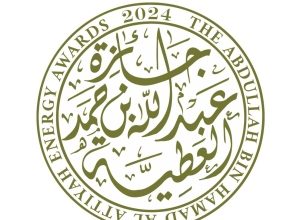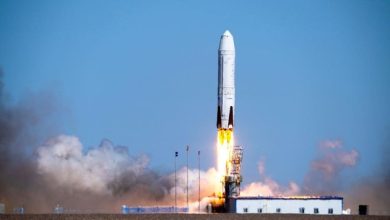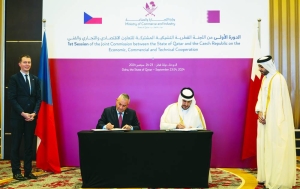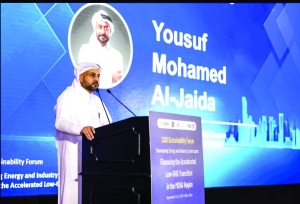Central Asia
Opec+ sticks to oil policy, repeats could pause October output hike
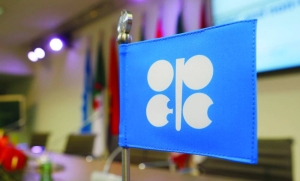

A flag with the Opec logo is seen before a news conference at its headquarters in Vienna (file). Opec+ is currently cutting output by a total of 5.86mn barrels per day, or about 5.7% of global demand, in a series of steps agreed since 2022 to bolster the market amid uncertainty over global demand and rising supply outside the group.
A meeting of top Opec+ ministers has kept oil output policy unchanged including a plan to start unwinding one layer of output cuts from October, and repeated that the hike could be paused or reversed if needed.
Several ministers from the Organisation of the Petroleum Exporting Countries and allies led by Russia, or Opec+ as the group is known, held an online joint ministerial monitoring committee meeting (JMMC) on Thursday.
Opec+ is currently cutting output by a total of 5.86mn barrels per day, or about 5.7% of global demand, in a series of steps agreed since 2022 to bolster the market amid uncertainty over global demand and rising supply outside the group.
In a statement after Thursday’s meeting, Opec+ said the members making the most recent layer of cuts — a 2.2mn bpd voluntary cut until September — reiterated that its gradual phase-out could be paused or reversed, depending on market conditions.
Oil prices have fallen from a 2024 high above $92 a barrel in April to below $81, pressured by concern about the strength of demand but finding support this week from increasing tensions in the Middle East.
Russian Deputy Prime Minister Alexander Novak said on Thursday the current level of oil prices was comfortable for Russia, its budget, and other participants in the market. Supply and demand remained in balance, he added.
“Starting from the fourth quarter, if the balance of supply and demand is positive, a partial increase in production is possible,” Novak said.
Opec+ still has some weeks before it needs to decide whether to proceed with the output hike from October, a source close to the group said.
Algeria’s Energy Minister Mohamed Arkab said uncertainties affecting oil markets were unlikely to continue for much longer, as long as the market remains adequately supplied.
Oil demand, he added, was expected to follow a sustained upward trend in the coming weeks.
Opec+ agreed at its last meeting in June to phase out the 2.2mn bpd cut over the course of a year from October 2024 until September 2025. It also agreed then to extend earlier cuts of 3.66mn bpd until end-2025.
Soon after that, Saudi Arabian Energy Minister Prince Abdulaziz bin Salman said Opec+ could pause or reverse the production hikes if it decided the market is not strong enough.
Thursday’s meeting also noted assurances from Iraq, Kazakhstan and Russia made during the meeting to achieve full conformity with pledged output cuts, the statement said. Those countries had earlier delivered plans to compensate for past overproduction. An Opec+ source said the chair of the meeting was insisting that members show commitment to the compensation plan.
The JMMC, which groups the oil ministers of Saudi Arabia, Russia and other leading producers, usually meets every two months and can make recommendations to the wider Opec+ group.
The JMMC will hold its next meeting on October 2.
Several ministers from the Organisation of the Petroleum Exporting Countries and allies led by Russia, or Opec+ as the group is known, held an online joint ministerial monitoring committee meeting (JMMC) on Thursday.
Opec+ is currently cutting output by a total of 5.86mn barrels per day, or about 5.7% of global demand, in a series of steps agreed since 2022 to bolster the market amid uncertainty over global demand and rising supply outside the group.
In a statement after Thursday’s meeting, Opec+ said the members making the most recent layer of cuts — a 2.2mn bpd voluntary cut until September — reiterated that its gradual phase-out could be paused or reversed, depending on market conditions.
Oil prices have fallen from a 2024 high above $92 a barrel in April to below $81, pressured by concern about the strength of demand but finding support this week from increasing tensions in the Middle East.
Russian Deputy Prime Minister Alexander Novak said on Thursday the current level of oil prices was comfortable for Russia, its budget, and other participants in the market. Supply and demand remained in balance, he added.
“Starting from the fourth quarter, if the balance of supply and demand is positive, a partial increase in production is possible,” Novak said.
Opec+ still has some weeks before it needs to decide whether to proceed with the output hike from October, a source close to the group said.
Algeria’s Energy Minister Mohamed Arkab said uncertainties affecting oil markets were unlikely to continue for much longer, as long as the market remains adequately supplied.
Oil demand, he added, was expected to follow a sustained upward trend in the coming weeks.
Opec+ agreed at its last meeting in June to phase out the 2.2mn bpd cut over the course of a year from October 2024 until September 2025. It also agreed then to extend earlier cuts of 3.66mn bpd until end-2025.
Soon after that, Saudi Arabian Energy Minister Prince Abdulaziz bin Salman said Opec+ could pause or reverse the production hikes if it decided the market is not strong enough.
Thursday’s meeting also noted assurances from Iraq, Kazakhstan and Russia made during the meeting to achieve full conformity with pledged output cuts, the statement said. Those countries had earlier delivered plans to compensate for past overproduction. An Opec+ source said the chair of the meeting was insisting that members show commitment to the compensation plan.
The JMMC, which groups the oil ministers of Saudi Arabia, Russia and other leading producers, usually meets every two months and can make recommendations to the wider Opec+ group.
The JMMC will hold its next meeting on October 2.




